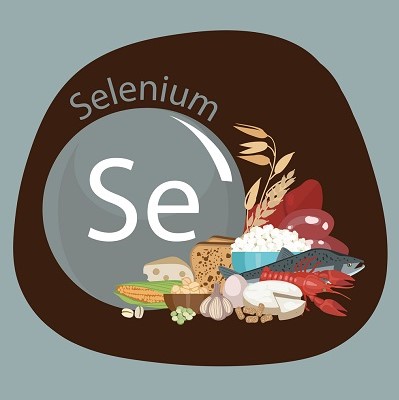 The mineral selenium appears naturally in soil, water, and a variety of different foods. It’s a trace mineral so we only need a small amount, but it still plays a vital role in the body’s metabolism. It’s well-known because it is an antioxidant, which provides protection for cells.
The mineral selenium appears naturally in soil, water, and a variety of different foods. It’s a trace mineral so we only need a small amount, but it still plays a vital role in the body’s metabolism. It’s well-known because it is an antioxidant, which provides protection for cells.
Selenium Deficiencies
As with all vitamins and minerals, our bodies need specific amounts to satisfy their requirements. However, we only need this mineral in small amounts. Yet, it is still possible for healthy Americans to experience a deficiency.
This is generally because the mineral is no longer present in the soil where food is grown. Also, there could be an underlying health problem at play, such as Crohn’s disease or HIV. People with these conditions are recommended to take a supplement.
Selenium has been used to treat infertility, asthma, dandruff, and arthritis. Although, there have been no conclusive results as to whether it has been effective as a course of treatment.
Natural Sources of Selenium
As selenium occurs naturally in the soil, it’s common for it to be found in various foods. The content will be dependent on where the product is grown and the soil conditions it has been exposed to.
For example, those Americans located in the Pacific Northwest and the Eastern Coastal Plain receive the lowest intake of selenium (though, it’s still enough to fulfill the recommended daily allowance).
You can find selenium in foods such as mushrooms, oats, soybeans, whole grain rye, wheat, sunflower seeds, Brazil nuts, eggs, cheese, shrimp, crab, turkey, salmon, oyster, pork, tuna, beef, and chicken. As you can see, these are common foods that you probably eat on a daily basis.
The Side Effects
There are no side effects to selenium, provided you are consuming a normal amount. The recommended daily allowance of selenium is around 60 micrograms for an adult, while anything over 200 mcg is considered to be reaching dangerous levels.
The average American gets around 125 mcg every day and even those in the regions with the lowest intake still manage 90 mcg. You don’t need to take a selenium supplement unless your doctor recommends it to you based on a pre-existing condition or the medications that you take.
However, there are side effects if you are receiving too much of the mineral. Too much can result in fever, nausea, bad breath, and other more serious symptoms like problems with the heart, kidneys, or liver. At a high enough level it can result in death.
Additionally, according to the University of Maryland, selenium has been known to interact with certain supplements and medications. This includes statins used to treat cholesterol, birth control pills, antacids, steroids, chemotherapy drugs, niacin, and more.
This is why it’s vital that you speak to your doctor before taking any type of supplement or changing your diet to increase your selenium levels.
There had been some evidence that taking a supplement can reduce the risk of prostate cancer, as well as lung and colorectal cancer. However, those studies haven’t been conclusive and yet, according to WebMD, there does seem to be a link between skin cancer and selenium. However, this is due to high levels of selenium.
As noted above selenium was initially believed to protect from skin cancer, however, studies have suggested that it can increase the risk of certain types of skin cancer.
Moreover, the belief that it reduces the risk of prostate cancer is not only proven, but the National Cancer Institute found that men with high selenium concentrations increased the risk of prostate cancer by double. Studies have also found that too high a dose of selenium can increase the risk of type 2 diabetes.






